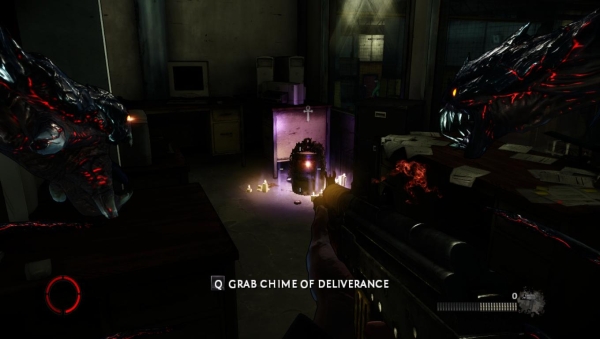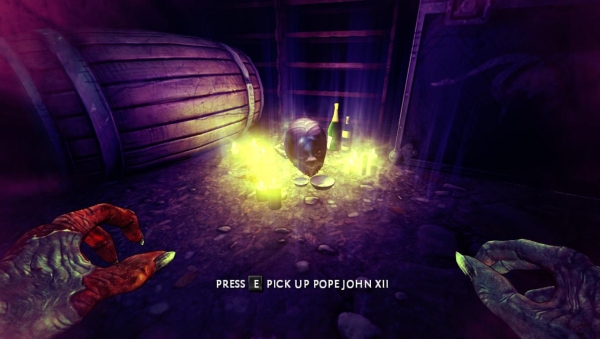
On the face of it, The Darkness II, by Digital Extremes, simply doesn’t seem like the kind of game I should be praising for its use of religion. It stars a character, Jackie Estacado, who is, by all rights, a very bad man. He wields a living weapon known as “The Darkness” that hates God and light in order to maintain his control of his New York-based mafia family. The game features other demonic characters as well as brutal and wildly graphic violence.
But on the up side, it handles religion extremely well. For starters, religion is not the main evil of the game. In fact, even as one possessed by the great-grandaddy of all “ghosties, ghoulies, long legged beasties, and things that go bump in the night,” Jackie’s enemies are not a pack of religious do-gooders. They are power-hungry occultists interested in acquiring The Darkness for themselves. The old cliche holds: They will stop at nothing to get what they want.1
The game has a somewhat redactionist approach to religion. The backstory of The Darkness II involves a constant struggle between the primordial Darkness, which infests one male host at a time, and the powers of God and light, which seek to destroy The Darkness. That struggle permeates many of the stories we are already familiar with from both western and eastern spirituality. Moses comes up a lot. The Buddha makes an appearance. And while there isn’t anything said about an interaction between Him and the Darkness, Jesus is referred to unequivocally as the Messiah.2
The mode of delivery for most of this revisionist history is a wholly optional item collection mechanic. Relics are distributed throughout the gameworld and each item has a lengthy description expertly and engrossingly read by David Hoffman’s character, Johnny Powell, after they’re collected by the player. The relics often have interlocking stories, creating a rich, if temporally distant, history to the game’s situation.

What is brilliant about this is that, by tying these story elements to well known religious tales, Digital Extremes manages to draw in a much richer history than any wholly novel world could. The game simply has to say “Moses wasn’t lost for forty years in the desert, he was fighting The Darkness and ringing this bell every 153 steps” and many players will import what they already know about Moses into the story. This technique is highly effective, and not just for theology students like myself. For the vast majority of people, you don’t have to put an encyclopedia entry for Moses in the game. Even if we only know some very basic things about him, or even think he didn’t exist, he is part of the backdrop of our real world. The Darkness II buys more player understanding with this sentence than the most fleshed-out codex entry in Mass Effect.
As well, while the game’s versions of stories are somewhat different than those that religious traditions provide, i.e. the Buddha’s last meal really was poisoned and a terrible fate was imposed on the Buddha’s soul afterward, they do not undermine the broad arcs of those stories. Moses might not be lost in the wilderness, but God is still bringing the Israelites out of the desert, the Ten Commandments are still given, and Moses doesn’t make it to the promised land (also for a different reason than given in the Bible).3 In other words, while the game tampers, it does so with an interesting kind of respect. This is different than what a work of fiction like “Buffy the Vampire Slayer” did, which was to say “Everything you learned about the beginning of the world from Judaism and Christianity is totally wrong.”
Also, one of the other things the game does extremely well is the depiction of evil fighting evil. This is not some kind of disinterested “bad guy turned good” story. Instead, it is a complicated tale of the lust for power, the lust for self preservation, and a single character’s willingness to sacrifice himself for someone he loves. And while that last part is redemptive, the game is not sentimental about the harsh lights and darks it paints for the supernatural powers of this world. Goodness is not soft; darkness is unyielding. And there is no “honor among thieves” here. While some level of moral goodness and friendship forms a camaraderie for several of the characters who work for Jackie, evil offers no such common ground.

On top of this, at one point there’s a Roman Catholic funeral that takes no pot shots at the religion at all. It keeps a sense of humor about the fact that these mafia men are also at least nominally religious. In fact, there is a story that Jackie tells at one point during a loading screen where he mentions a priest who came to his orphanage. Immediately he tells you to get your mind out of the gutter because it isn’t “that kind” of story. The game is almost forcefully pushing back against the areas where the media has taken cheap shots at religion by demonizing it or putting its worst side forward.
God, evil, and the Bible are central to a deeper understanding of the main story of The Darkness II. This is very likely due to the game’s rich comic book origins. However, telling a story with both the kind of restraint and fantastic imagination that The Darkness II does is difficult in modern media in general, let alone in video games. Other game developers should look closely at what Digital Extremes did here, both with storytelling and with their approach to religion.
1. One could digress into a discussion here of the Anselmian distinction between the two meanings of the word “nothing” in the Monologion and then make a kind of highbrow theological pun about the fact that what they are in fact stopping at is indeed “nothing” in a kind of Athanasian understanding of non-entity of evil model found in Contra Gentes, but popularized by St. Augustine. But let’s just say that I made that digression, all have a laugh, and then return to the discussion at hand.
2. By this, the game clearly implies that Jesus is the person that Christianity claims He is, i.e. the Son of God and savior of the world. This is done specifically in the description of an artifact that contains a foreskin… yeah.
3. This kind of modification could, of course, be very offensive to some. For those whose view of the Bible is such that the term “inspiration” means “literal historical dictation of events” in a kind of news-reporter style, then any implication that the Bible might be “wrong” is a slight against one of the major tenets of their faith. However, one might argue that what the game is doing is a kind of fantastical Midrash of the Bible, in the same way that a book like “The Assumption of Moses” is. Such a practice is well established in ancient Jewish, Catholic, and Orthodox traditions.







